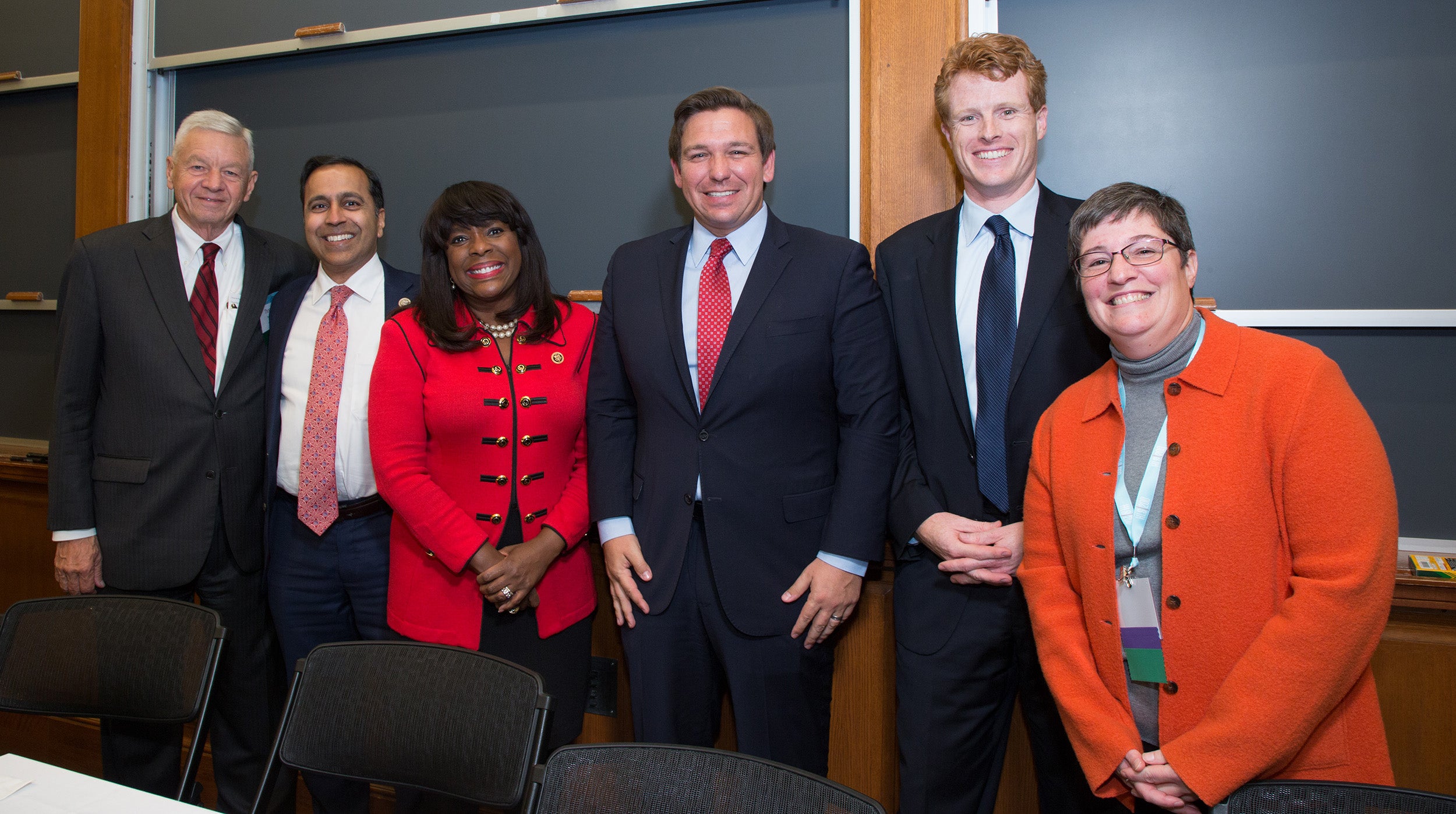The tradition of HLS graduates in the House of Representatives goes back to the mid-19th century, beginning when John Gardner Abbot 1832 and Ebenezer Rockwood Hoar 1839 represented Massachusetts in the 44th and 43rd Congresses. As part of Harvard Law School’s bicentennial summit on Oct. 27, five graduates currently or formerly in the House, gathered for a panel discussion centered on social media and the polarized electorate, underlining how sharply things have changed since the 1800’s.
The panelists represented both major parties and a diversity of backgrounds: Joseph P. Kennedy III ’09 (D-Massachusetts), Raja Krishnamoorthi ’00 (D- Illinois), Thomas E. Petri ’65 (R-Wisconsin), Terri Sewell ’92 (D- Alabama) and Ron DeSantis (R- Florida). Moderator Harvard Law School Professor Adriaan Lanni asked whether real-life governing can embody the ideal of constructive argument that’s encouraged in law school, and the answers weren’t always positive.
“Social media has debased the discourse, there’s no way around that,” DeSantis said. “It’s a mistake to view the partisanship as top-down, when it’s really bottom-up: Elected officials represent the passions of our districts.” The news media, he said, has done its own part to lower the dialogue. “They rarely cover hugs and handshakes; they cover hand grenades. Recently I introduced my first bill, a bipartisan education bill. We did everything possible to get media attention for that, and we couldn’t. Instead they asked me if I wanted to attack the president.”
Petri agreed. ”Division and controversy isn’t coming from Congress, it’s reflecting what is happening in society. Congress and other institutions are struggling to adjust to the information technology revolution. You’re driven by the object on TV that gets eyeballs.” One result, he noted, is that Congressional votes are no longer tallied by the formal process of calling each member individually—a process that showed the significance of each vote, but took hours and made for less than compelling TV.
Kennedy added that the cause for optimism lies in local politics. “Congress is going to be a symptom of the rhetoric out there, not wholly the cause of it. But when you start to localize the issues, it’s really a different deal, and that’s where you find the similarities. One recent example would be community health centers. Almost everybody in Congress supports them, and the fight isn’t about whether they’re good, but how to pay for them. So when you start localizing some of these challenges, you can build on them.”
Panelists described how they had to artfully navigate some hot-button issues. As a politically progressive African-American woman, Sewell stands out in her home state of Alabama, where she’s the only Democrat in Congress. At one of her first town meetings, she was confronted by someone who was passionately anti-abortion. “I explained why I was pro-choice and how I had gotten to that position; he at least turned to his wife and nodded. Your constituents have to know that you’re one of them. For another example, Alabama loves its guns and there are a lot of military bases in my district, so there probably isn’t a defense bill that I didn’t vote for. So that lost me my F rating from the NRA; for the first time in my life I got a D.”
Sewell said that as a freshman House member she was surprised both by the civility of her colleagues, and by the dysfunction of the legislative process. “The politics of the politics can be mind-boggling, and frankly takes away from the opportunity to do my job. For instance, we have not yet reauthorized the Children’s Health Insurance Program (CHIP), which expired on September 30. I am told it will be tacked onto something, and meanwhile I have parents desperate to know if their sick child will have insurance.”
As a Hindu American with an exotic name, Krishnamoorthi said he’s had to address his “otherness” head-on, which wasn’t easy when some of his political opponents tried to use it against him. One opposing candidate even ran an attack ad implying he had links to terrorism. “In every meeting I went to, the first question was always about my name and what it means. So I said that translated from an ancient language it means ‘Congressman for the 8th district of Illinois.’ I tackled the elephant in the room right out of the box, and I made fun of myself—That made me human. Anyone here can do that, but it takes a light touch.”
But he says he’s had to make some tougher political choices, most recently over President Trump’s Muslim travel ban. “I never thought I would be traveling to O’Hare Airport to save some American green card holders. But there were people in my district who thought it was perfectly OK for the president to do what he did. So was I going to emphasize my otherness by standing up for [the immigrants at O’Hare], or was I going to take a pass and be silent? I decided on the former, since it was what I came to Congress to do.”
As Kennedy pointed out, knowing how to articulate your opinion is always an advantage. “I don’t think I’ve met anyone who agrees with me on everything. But if you have a well-formed opinion and you can defend it, people will cut you a large amount of slack. Parroting talking points is what gets you into trouble. No matter what you do, half the people are going to get mad at you. Your choice is, which half?”
While HLS pride ran strong in the event, some of the panelists noted that a Harvard connection doesn’t always play with some parts of the electorate. Krishnamoorthi recalled working on Barack Obama’s 2002 Senate campaign, where the candidate’s Ivy League background had to be played down. And DeSantis said that a Harvard diploma was something he sometimes had to downplay in Republican circles. “When I ran in my first primary, it was more of a scarlet letter.”
